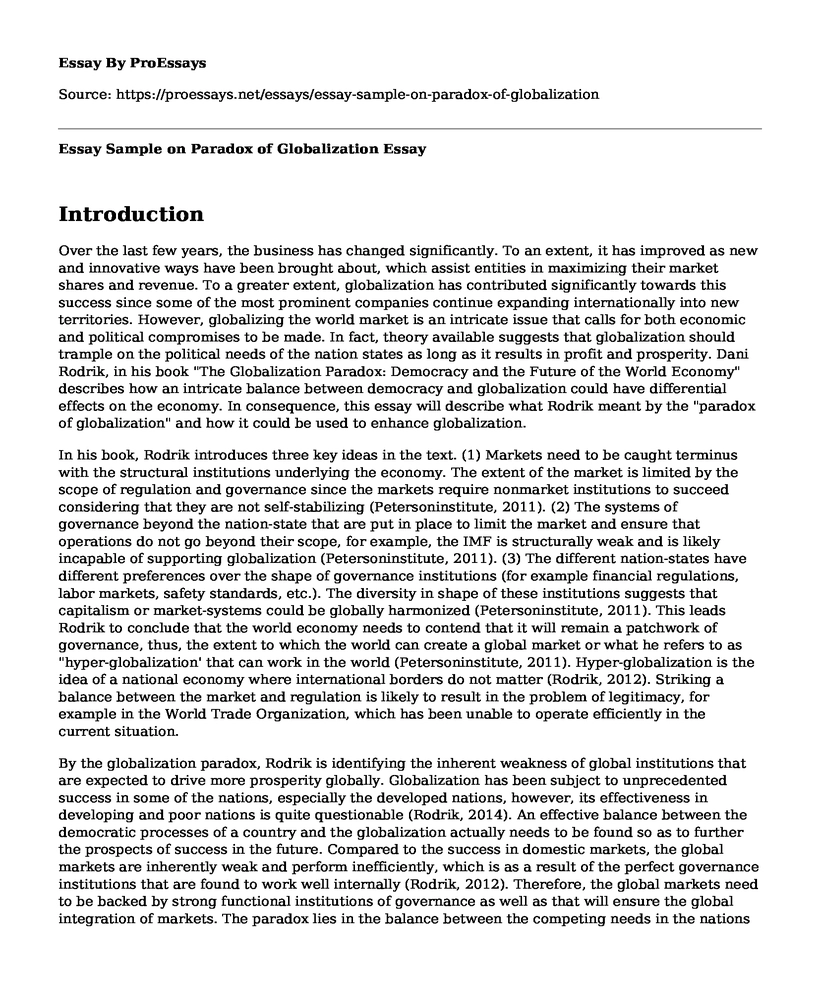Introduction
Over the last few years, the business has changed significantly. To an extent, it has improved as new and innovative ways have been brought about, which assist entities in maximizing their market shares and revenue. To a greater extent, globalization has contributed significantly towards this success since some of the most prominent companies continue expanding internationally into new territories. However, globalizing the world market is an intricate issue that calls for both economic and political compromises to be made. In fact, theory available suggests that globalization should trample on the political needs of the nation states as long as it results in profit and prosperity. Dani Rodrik, in his book "The Globalization Paradox: Democracy and the Future of the World Economy" describes how an intricate balance between democracy and globalization could have differential effects on the economy. In consequence, this essay will describe what Rodrik meant by the "paradox of globalization" and how it could be used to enhance globalization.
In his book, Rodrik introduces three key ideas in the text. (1) Markets need to be caught terminus with the structural institutions underlying the economy. The extent of the market is limited by the scope of regulation and governance since the markets require nonmarket institutions to succeed considering that they are not self-stabilizing (Petersoninstitute, 2011). (2) The systems of governance beyond the nation-state that are put in place to limit the market and ensure that operations do not go beyond their scope, for example, the IMF is structurally weak and is likely incapable of supporting globalization (Petersoninstitute, 2011). (3) The different nation-states have different preferences over the shape of governance institutions (for example financial regulations, labor markets, safety standards, etc.). The diversity in shape of these institutions suggests that capitalism or market-systems could be globally harmonized (Petersoninstitute, 2011). This leads Rodrik to conclude that the world economy needs to contend that it will remain a patchwork of governance, thus, the extent to which the world can create a global market or what he refers to as "hyper-globalization' that can work in the world (Petersoninstitute, 2011). Hyper-globalization is the idea of a national economy where international borders do not matter (Rodrik, 2012). Striking a balance between the market and regulation is likely to result in the problem of legitimacy, for example in the World Trade Organization, which has been unable to operate efficiently in the current situation.
By the globalization paradox, Rodrik is identifying the inherent weakness of global institutions that are expected to drive more prosperity globally. Globalization has been subject to unprecedented success in some of the nations, especially the developed nations, however, its effectiveness in developing and poor nations is quite questionable (Rodrik, 2014). An effective balance between the democratic processes of a country and the globalization actually needs to be found so as to further the prospects of success in the future. Compared to the success in domestic markets, the global markets are inherently weak and perform inefficiently, which is as a result of the perfect governance institutions that are found to work well internally (Rodrik, 2012). Therefore, the global markets need to be backed by strong functional institutions of governance as well as that will ensure the global integration of markets. The paradox lies in the balance between the competing needs in the nations states that suggest it is impossible to pursue democracy, national determination, and economic globalization simultaneously (Rodrik, 2012). Eventually, however, Rodrik argues that the most valuable solution to this quagmire is empowering democracies to make the necessary changes that suit their economy preferences making the world economy healthier and safer to invest.
Conclusion
In conclusion, the paradox lays in the fact that though globalization is expected to trample on democracy and national ambitions, it can work better if the democracy is enhanced to create better globalization. Different nation-states have different preferences; therefore, there should be a thin line in the international laws that allow individual nations to make policy decisions that suit their economies. In consequence, globalization will be safer and more effective for future investment.
References
Rodrik, D. (2012). The globalization paradox: Why global markets, states, and democracy can't coexist. Oxford: Oxford University Press.
Rodrik, D. (2014). The Globalization Paradox. Social Europe. Retrieved from: https://www.socialeurope.eu/globalization-paradox
PetersonInstitute. (2011, May 6). Dani Rodrik: The Globalization Paradox: Democracy and the Future of the World Economy [video file]. Retrieved from: https://www.youtube.com/watch?v=lRKPuhH4TZg
Cite this page
Essay Sample on Paradox of Globalization. (2022, Apr 12). Retrieved from https://proessays.net/essays/essay-sample-on-paradox-of-globalization
If you are the original author of this essay and no longer wish to have it published on the ProEssays website, please click below to request its removal:
- Discrimination, Performance Management, Performance Appraisal, Affirmative Action and Employment
- Research Paper on Hierarchical Market Entry Modes
- Command Economy Essay Example
- Essay Example on Chobani Yogurt: Succeeding in a Crowded Business Market
- Research Paper on Supply and Demand in Public Health
- Essay Example on Misconduct in Employment: Section 593 of Labor Law Explained
- Gemstone Co. Aligns with OSHA VPP, AIHA Z10 & Identifies Red Flags - Essay Sample







